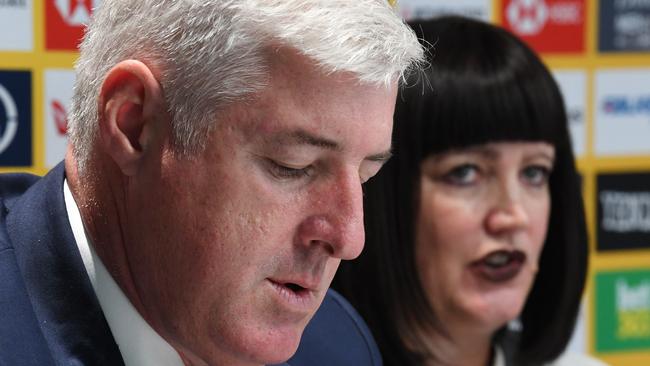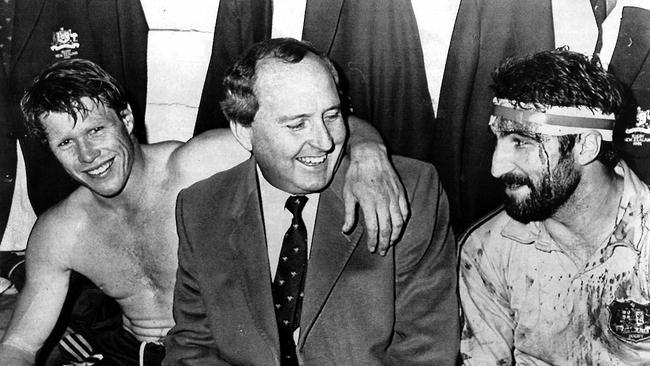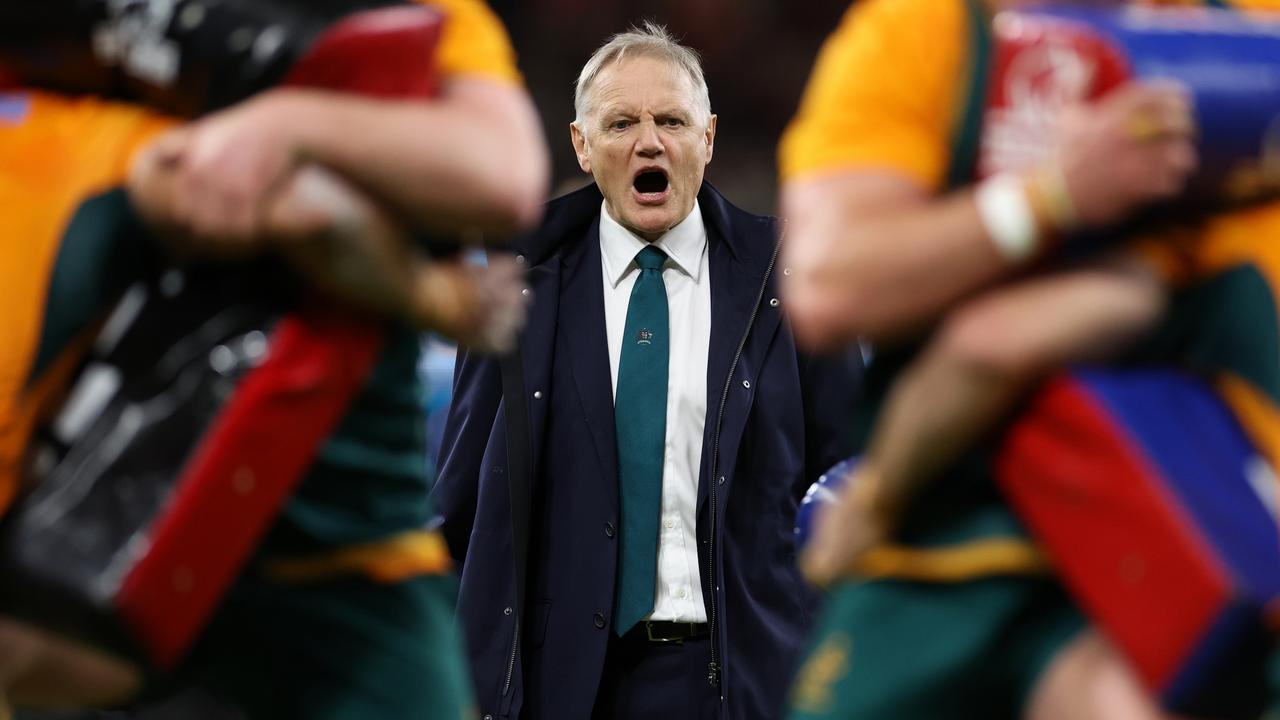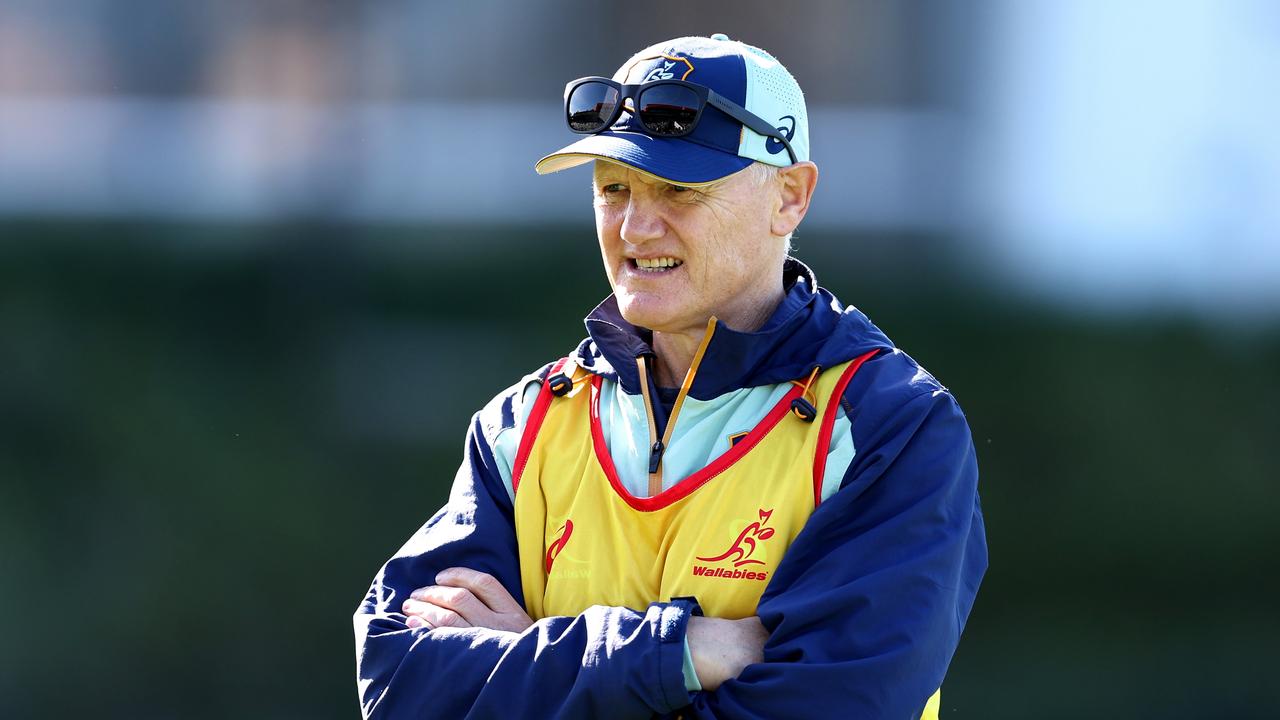Rugby Australia is guilty of all seven deadly sins

Unsurprisingly, a lot has been written this week about the future of chief executive Raelene Castle at Rugby Australia.
It is a little bit unfair on Castle because she and the board of Rugby Australia are indivisible.
Much of what has been printed in the defence of both has come from a select group of apologists who are either fellow Kiwis or disappointing journalists happy to make a living writing pieces fed to them by “Team Rugby Australia”.
Looking beyond all that rubbish, there was one voice last week that rang loud and clear, and that was the voice of Nick Farr-Jones, a World Cup-winning Wallabies captain who thinks with a sharp business mind and speaks with a sense of balance and empathy.
Put simply, he loves the game and he has runs on the board in serving it.

At this moment, our game is crying out for strong leadership from a unifying individual with unchallengeable rugby credentials. Nick Farr-Jones is such a person. On top of this, his values are genuine and credible. So when Nick described Rugby Australia as being “unbankable”, he hit the nail on the head. There is no way anyone would lend Rugby Australia a penny right now without appropriate income streams in place.
Most keen rugby people would also know that Farr-Jones is a man of great faith. He may not believe in the seven deadly sins, but there are seven reasons why Raelene Castle and her board — indivisible — must resign or be sacked immediately.
The seven deadly sins are sloth, gluttony, greed, pride, anger, envy and lust.
Let’s start with sloth.
Sloth can be described as laziness, or avoiding work instead of being diligent. On Raelene Castle’s watch, the game has wobbled and fallen.
The Wallabies are ranked seventh in the world, down from third when she took over in 2017.
Crowds and television viewing audiences for Super Rugby and the Wallabies are down by 50 per cent over the same period.
The evidence would suggest that Castle has presided over a slothful period in our game’s history. Most people in club land will tell you that participation numbers are also down.
The rugby clubs get zero, while the professional game churns through $150m a year feeding the professional “elite”.
The stats are not favourable for Castle or the board.
Both have one main job: grow the game. On that note, they have failed miserably.
So let’s move from sloth to gluttony.
Gluttony can be described as consuming, to unhealthy excess, instead of being moderate.
Raelene Castle and the board had the chance to lock in a broadcast deal at the Rugby World Cup last year.
Instead of accepting a generous offer from the game’s biggest sponsor, close to the current deal, Raelene Castle, backed by the board, asked for a 25 per cent increase to grandstand to the rugby world. Clearly, her/their lack of judgment was a monumental mistake and has essentially bankrupted the game. Fox Sports is the biggest revenue stream Rugby Australia will see. But they were waved goodbye.
From gluttony, we now move on to greed.
Greed, as my readers know, is placing too much importance on possessions instead of being generous toward others.
There is no doubt that when Castle threw Israel Folau under the bus, she and the board chose to side with Alan Joyce and Qantas over the three-time John Eales Medal winner. The decision was simply based on greed.
Joyce and Qantas pay Rugby Australia $4m a year and Folau was earning about $1m a year. It was better financially for Castle and the board to crucify Folau to maintain the Qantas sponsorship.
Ultimately, the courts agreed that Rugby Australia and Castle had run a “Kangaroo Court” to banish Folau from the game — a costly mistake.
So from greed we move on to the next sin, pride.
Pride is esteeming oneself above others instead of being humble and selfless.
That is the only way we can surely describe Castle’s actions surrounding the staff sacking massacre on April Fool’s Day.
Days before, Castle, supported by the board, announced she would take a 50 per cent pay cut and her executive staff were taking 30 per cent cuts. How generous that sounded, days before the long knives came out.
But once Rugby Australia, via their CEO, had milked the PR on her allegedly generous pay sacrifice, the next move was to sack 100 people from head office — that’s 100 breadwinners getting a 100 per cent pay cut.
Surely Castle and the board should have resigned in shame by now.
If they are too proud to resign, at least Castle and executive staff, and anyone on the board who is paid (spare me that thought!) should offer to work for nothing until the mess is fixed up.
From pride let’s move on to anger.
Anger is acting in hostility, or desiring revenge, instead of being patient and acting with charity when resolving conflict.
Castle and her board acted in anger when they forced Michael Cheika to eat humble pie in the lead-up to the 2019 World Cup.
When the Wallabies’ results of 2018 undermined the authority of Cheika, Castle had her revenge by forcing him to answer to Scott Johnson.
Johnson has never won anything. Cheika has won a European Championship and a Super Rugby title.
Cheika was clearly the primary mover and shaker at Rugby Australia and Castle had no control over him when she joined in 2017. People at Rugby Australia tell me that Castle enjoyed seeing the authority of Cheika being diluted.
Johnson is her appointment, Cheika was not. Castle’s anger essentially sabotaged the Wallabies’ 2019 Rugby World Cup campaign.
So from anger, let’s move along to envy.
Envy is resenting others for their gifts instead of showing kindness to others.
Most people close to the game know that Phil Kearns was meant to get the CEO job in 2017.
I am not suggesting that was the right move either. The job should have been widely advertised and those choosing the winning applicant should have been people competent in the values and expectations of the game.
Be that as it may, the only reason Kearns didn’t get the job was because there was a major objection from a state union. It meant Castle fell into the job because nobody else was considered.
Castle’s appointment has been part of a Kiwi invasion at all levels of our game – administrators, coaches and players. The “Kiwification” of Australian Rugby has been due to envy.
We are so obsessed with the success of the All Blacks that we assume the Kiwis know best and we have forgotten that we were once the most successful and innovative rugby nation in the world.
The “Kiwification” of Australian rugby is evidenced by recent key appointments – Castle as CEO; Dave Rennie, the Wallabies coach; Andrew Hore, the CEO of the Waratahs; Daryl Gibson, the former Waratahs coach; Rob Penney, the new Waratahs coach; Simon Cron, the Waratahs forwards coach; and Brad Thorn, the Queensland coach.
The vast majority of these recent Kiwi appointments have been massive busts.
We have taken on board Kiwis who are not good enough to secure jobs in New Zealand.
Let’s move from envy to lust.
Lust is desiring what is not yours, instead of showing discipline and refraining from indulgence. The appointment of Rennie to the position of Wallabies coach is lustful and extreme, and he will inevitably disappoint.
Rennie is already talking about walking away if Castle is sacked. From my perspective, that would be a blessing. Neither of them should hold positions in Australian Rugby.
Rennie sells himself as a back-to-back Super Rugby title winner with the Chiefs, and that is bought by some sections of the media. But anyone who knows their rugby understands that these titles were won with Wayne Smith driving the program.
Smith is a brilliant coach. He was the force behind the cultural revolution within the All Blacks. And his impact on the Waikato Chiefs is known and obvious.
As soon as Smith left, the team went from winners to battlers. In fact, Rennie was forced out of New Zealand rugby after the Chiefs’ “Strippergate” scandal in 2016.
He has been in Glasgow since that debacle and, surprise surprise, they have won nothing.
Rennie might be threatening to walk away from his Wallabies post if Castle is sacked, but most sources say he is worried about the lack of finance in the Australian game.
Should Rennie go, he wouldn’t be the first Kiwi to accept a handsome rugby settlement.
Mercenary?
There you have it.
The seven deadly sins of the indivisible team — Castle and the board of Rugby Australia.
Farr-Jones made the call earlier this week. We should listen to his voice and disregard “Team Castle” and “Team McLean” and their awkward attempts to rewrite history.
Now, at this Easter time, rugby lovers survey the destruction that is overtaking our game. Easter is, in the first instance, about crucifixion. The indivisible team of Castle and the Ruby Australia board have crucified our game.
But there is hope.
Easter Sunday is about the resurrection. In all things, including rugby, the crucifixion and the resurrection have relevance.
The crucifixion of Jesus of Nazareth was a statement of human nature, demonstrating the power that evil has to distort truth.
The crucifixion, which is the religious metaphor of Good Friday, proves that goodness offered Jesus no protection.
But the Easter message of Sunday reminds us that there are crucifixions in every generation.
On Easter Sunday, we remember the resurrection.
Just as, amidst the death and evil of Good Friday we have the hope of Easter Sunday, so too, in the crucifixion of our game, we are entitled to enjoy the hope that better times await under the management of different people.


